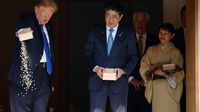TOKYO (Reuters) - Japanese Prime Minister Shinzo Abe is under renewed scrutiny after altered documents released on Monday related to a land sale to a school operator with ties to his wife raised the possibility of a cover-up in a favouritism scandal.
Questions about the sale of land - sold at a huge discount that officials said was for clean-up costs - have dogged Abe since it became public last year.
Abe has denied that he or his wife did any favours for the school operator, Moritomo Gakuen, which promotes a nationalist education curriculum. Abe has said he would resign if evidence were found that they had.
The controversy had faded but erupted again when media reported that official documents about the deal had been changed, prompting the Ministry of Finance to release to parliament 14 documents that showed various changes.
WHY DO THESE ALTERATIONS MATTER?
Before-and-after versions of the documents, seen by Reuters, do not appear to amount to a "smoking gun" showing direct intervention in the land sale by either Abe or his wife, Akie.
The changes include the removal of a reference to a visit to the school by Abe's wife and to ties that Abe and Finance Minister Taro Aso had to a conservative lobby group, Nippon Kaigi - both well-known facts.
The records include a comment from Yasunori Kagoike, the former head of Moritomo Gakuen, citing Akie Abe as telling him: "This is good land so please proceed."
Aso told a news conference on Monday that ministry officials altered the documents to make them conform with testimony in parliament by the then-head of a ministry division, Nobuhisa Sagawa, who abruptly resigned last week.
But the alterations do fuel suspicion of a cover-up, which could be more damaging to Abe and Aso than the original land sale itself.
If the scandal blows up, with evidence emerging that Abe was indeed involved, or his reasonably strong public approval rates plunge, he could eventually resign, though it is too early to predict that now.
WHAT HAPPENS TO ASO?
Aso on Monday said he would not resign, but pressure on him to step down is likely to grow - at least to take responsibility for poor oversight of his ministry.
Abe is expected to try to keep Aso, who doubles as deputy premier, in his important finance post. But the arrest of any officials over the alteration of the public documents would worsen Aso's position and make it even harder to stay on.
Already public anger is growing. A Sankei newspaper poll over the weekend said 71 percent of respondents said Aso should go.
WHAT NEXT?
Abe and Aso will try to contain the damage until the furore subsides. Aso's first line of defence is to say he must stay on to ensure a thorough investigation of the matter at his ministry.
But even some members of the ruling Liberal Democratic Party have said that blaming bureaucrats is not feasible.
Among those party members is former Defence Minister Shigeru Ishiba, who has made no secret of his desire to run for LDP president in a September election in which Abe hopes to win a third term, and Shinjiro Koizumi, popular son of former prime minister Junichiro Koizumi.
The response of senior LDP lawmakers such as party Secretary-General Toshihiro Nikai will be critical to any effort to protect Aso, as well as to containing the fallout for Abe. So will the response of the LDP's junior coalition partner, the Komeito party.
WHAT IF ASO QUITS?
Losing Aso would be a big blow to Abe politically, but direct policy implications would probably be limited.
Aso is vital to the stability of his administration and key to his bid for a third term as LDP president in a September party election, which would pave the way for him to be Japan's longest-serving prime minister.
Factional manoeuvring to replace Abe - either before the September election or at that point - would surely heat up if Aso resigned.
WHAT ARE BROADER IMPLICATIONS?
Some financial market players worry about the impact on "Abenomics" policies of hyper-easy monetary policy, fiscal spending and structural reform. Possible Abe successors including former foreign minister Fumio Kishida, as well as Ishiba, have spoken about the need to fix Japan's ballooning debt with fiscal consolidation.
A bigger concern is that the scandal could kickoff a period of political instability. Abe is now in his sixth year in office, rare longevity in a country which saw a string of revolving-door leaders before he took office.
Japan also faces the security worry of North Korea's missile and nuclear threat. On the trade front, it must deal with U.S. President Donald Trump's protectionist policies.
Abe's warm ties with Trump and his acquaintance with other world leaders has been seen as a diplomatic plus, so a change of leadership could be a blow.
(reporting by Linda Sieg; Editing by Malcolm Foster, Robert Birsel)



